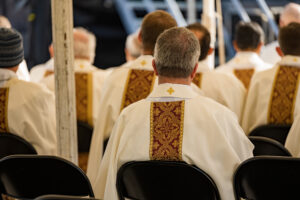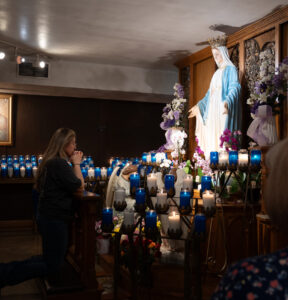By Fr. Nathan
There are times of year in the parish church calendar when the congregation is asked for help by the donation of their “Time, Talent, and Treasure.” This is a legitimate request for the members of the parish to charitably volunteer to help with parish events, especially if they have expertise in some area. If they can’t volunteer, they are often asked to donate to the event instead. It is a good reminder of what we owe to the local parish to which we belong, where we receive the sacraments.
But I would like to ask you to turn this adage into a phrase to help understand the Catholic Church’s teaching on the ancient doctrine and practice of indulgences. Time and Treasure help us understand the teaching on indulgences, and Talent is about putting that teaching into practice. Let’s first remind ourselves what an indulgence is:
“An indulgence is a remission before God of the temporal punishment for sins, whose guilt is forgiven, which a properly disposed member of the Christian faithful obtains under certain and clearly defined conditions through the intervention of the Church, which, as the minister of Redemption, dispenses and applies authoritatively the treasury of the expiatory works of Christ and the saints.” (Manual of Indulgences, 2006, Norm 1)

Time and Purgatory
The idea of “temporal punishment” brings us to the concept of time and the doctrine of Purgatory. This doctrine is a uniquely Catholic one that deeply bothers those antagonistic to the faith. But as we give it some careful thought, we can understand it as one of the most beautiful doctrines springing from Divine Mercy. It is a combination of God’s love and perfection, our sinfulness, and His desire to save us.
The infinite perfection of God is such that there is no “partnership” between God and sin. As St. Paul says, “For what partnership is there between righteousness and lawlessness? Or what fellowship is there between light and darkness?” (2 Cor. 6:14) Entry into Heaven, that eternal life with God, asks for perfection. Jesus has asked us to be perfect as his heavenly Father is perfect, and we have our lifetime in which to achieve this with the help of His grace.
But in our lifetime, we do fall into sin, and that carries with it several consequences. Two of these in particular pertain to our discussion on indulgences: eternal punishment and attachment to sin. Mortal sin has both of these as natural effects; venial sin carries attachment to sin, which is purified by temporal punishment. Eternal punishment is obviously hell, and we are freed from it only by a good and holy confession. However, for both mortal and venial sins, the temporal punishment of sin remains after confession, that “unhealthy attachment of creatures, which must be purified, either here on earth or after death in the state called Purgatory.” (CCC 1472)
It is tempting to think of Purgatory and temporal punishment as the same thing, but they’re not quite. Purgatory is temporal punishment after death. But temporal punishment can be experienced before our death, by “patiently bearing sufferings and trials of all kinds . . . by works of mercy and charity, as by prayer and the various practices of penance.” (CCC 1473) Temporal punishment is first of all worked out during our earthly life, and in fact this is much easier to do while we are alive than after death. This is because after death, our suffering no longer merits graces or eternal life, while on earth it is united to Christ’s passion and death for our salvation.
And this is the Time, “now is the day of salvation!” (2 Cor 6:2) We use our time on earth to live out temporal punishment so we don’t have to suffer in Purgatory. But the gravity of sin reminds us that we can’t suffer by ourselves everything that would make reparation for our sins. Pope St. Paul VI reminds us of this in Indulgentiarum Doctrina:
Every sin in fact causes a perturbation in the universal order established by God in His ineffable wisdom and infinite charity, and the destruction of immense values with respect to the sinner himself and to the human community. Christians throughout history have always regarded sin not only as a transgression of divine law but also—though not always in a direct and evident way—as contempt for or disregard of the friendship between God and man, just as they have regarded it as a real and unfathomable offense against God and indeed an ungrateful rejection of the love of God shown us through Jesus Christ, who called his disciples friends and not servants. (ID 2)
Given the gravity of evil, how can something as small as an indulgence wipe out temporal punishment?
Treasure
This brings us to talk about the treasury of the Church, “which should certainly not be imagined as the sum total of material goods accumulated in the course of the centuries, but the infinite and inexhaustible value the expiation and the merits of Christ Our Lord have before God.” (ID 5) The world often only sees value in material things, but as Catholics we have to remind ourselves often that the grace won for us by Jesus Christ is so valuable that we should even give our lives to possess it, as the martyrs did.
This treasury is not without an administration, though. As Jesus left the Apostles as his successors and leaders, he also gave them authority, that “whatever you bind on earth will be bound in heaven, and whatever you loose on earth will be loosed in heaven.” (Matt18:18) This verse is foundational for the authority to forgive sins, and would lead gradually to the Church’s authority to set the conditions for the remission of temporal punishment while in this life.
The purpose of temporal punishment, to get rid of attachment to sin, does not have to be painful. In fact, detachment from sin also comes about with greater love for God. And so the practices by which we gain indulgences, and the conditions attached thereto, are aimed at enkindling this love of God, of bringing us into relationship with Him. This is probably why the majority of indulgences has to do with prayers said, rather than works of penance strictly speaking.
The treasure of the Church is open to all the faithful in the state of grace, and it is a far greater treasure than all earthly riches. To grow close to God, and to avoid the refining fires of Purgatory by good works on earth, is something to rejoice over. So how does one access this treasury?

Talent
Talent is one of those things which one might have naturally, but it also needs work. One might have a
natural gift for something, a knack for playing music, but without practice or application, that talent might go to waste. Something similar applies to the gaining of indulgences. All the baptized in the state of grace have the “knack,” as it were, by means of their Baptism and sharing in the communion of saints, to gain indulgences. But not all of us put it into practice, by fulfilling the conditions or doing indulgenced works.
There are two types of indulgences which can be gained by doing an indulgenced work. A partial indulgence remits or takes off some time in purgatory. A plenary indulgence remits all of one’s time in purgatory.
Partial indulgences only require only have two conditions: to be in a state of grace, and to intend to gain the indulgence.
But the plenary indulgence requires four other conditions, because of its greater value. We put it into practice by fulfilling the conditions. These are as follows:
- Complete detachment from sin, both mortal and venial
- Sacramental confession within approximately 20 days before or after the indulgenced work (one confession suffices for several indulgences)
- Receive Holy Communion (on the day of the indulgenced work)
- Pray for Pope (usually one Our Father and one Hail Mary)
Fulfilling these conditions, especially the detachment from all sin, even venial sin, is the “talent” that we all have to work on. As one priest I know said, “This is a switch in the heart that should always be in the ‘on’ position.” We should always be striving for this detachment, difficult as it is. The mercy of God is so great though, that if complete detachment is not fulfilled, or one of the other three conditions, the indulgence gained is partial, not plenary. Our good works do not go to waste.
What can you do from here?
The best thing about partial indulgences is that you can receive as many in a day as you can do the good works. Only one plenary indulgence may be gained in a day, either for yourself or a departed soul.
The wonderful doctrine of indulgences encourages us to hope in God and learn to love Him better. The Lord has given us access to a great mercy on His part, to grow closer to Him in this life using our Time, the Church’s Treasure, and His Talents to grow closer to Him while at the same instant getting rid of time spent away from Him.
Receive a Jubilee Indulgence at Champion Shrine
A plenary indulgence, or Jubilee Indulgence, might be obtained by devoutly visiting the National Shrine of Our Lady of Champion during the Jubilee Year.
An indulgence is a powerful gift to the souls of believers. Indulgences aid in healing the brokenness caused by our sins in this world and reduce or completely eliminate the temporal punishment due to our sins. Indulgences are either partial or plenary (complete), and may be obtained for oneself or for the souls of the deceased. One plenary indulgence may be received each day.
Start planning your pilgrimage today at ChampionShrine.org/visit.


